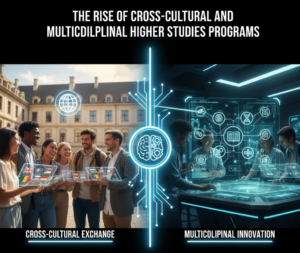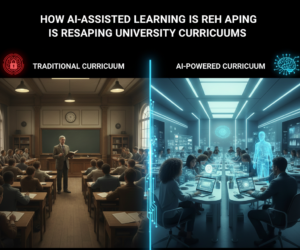The growing importance of degrees that span multiple fields

The growing importance of degrees that span multiple fields
Education has always been the foundation of innovation. However, in today’s fast-paced world, the lines between traditional fields are not as clear as they used to be. Interdisciplinary degrees, which mix the knowledge and methods of several different fields, are becoming more and more valuable. This strategy gives students and professionals the freedom, creativity, and problem-solving skills they need to do well in today’s industries and global issues, which are getting more complicated all the time.
As we break down traditional academic silos,
In the past, schools told students to focus on one subject. For example, engineers studied engineering, doctors studied medicine, and artists studied fine arts. Even though it is still very important to have a lot of knowledge, you can’t find the answer to today’s problems like climate change, cybersecurity, or global health issues in just one area of study. Interdisciplinary programs break down silos, allowing people from different fields to work together to find new solutions.
In today’s world, meet the needs of the job market.
Employers today value people who can adapt. A graduate who has both technical skills and good communication skills is often more competitive than one who only has technical skills in one area. For instance:
- Tech companies want people who know more than just how to code. They also want people who know about business, ethics, and design.
- The healthcare field needs people who are good at both medicine and data science.
- The sustainability industries need people who can connect environmental research with economics and policy.
- Degrees that combine a lot of different fields give you this kind of breadth.
How Cross-Pollination Can Make You More Creative
Combining ideas from different fields has led to some of the most important changes in human history. Computer science, math, psychology, and linguistics are all parts of artificial intelligence. Biotechnology is made up of biology, chemistry, and engineering. Interdisciplinary degrees formalize this type of knowledge mixing by giving students structured ways to learn about many different fields.
Preparing Students for Complicated Global Issues
There are many problems in the 21st century that can’t be easily put into groups. To solve problems like climate change, digital privacy, pandemics, and city planning, experts in science, politics, economics, and social behavior need to work together. Students who receive interdisciplinary training learn to think critically across disciplines, which equips them to address real-world challenges more effectively.
The Effects of Hybrid Careers
Interdisciplinary education is on the rise, resulting in the development of novel hybrid professional pathways, including the following:
- Neuroeconomics is a mix of psychology, economics, and neuroscience.
- Bioinformatics is a mix of biology and computer science.
- The intersection of environmental science and environmental law
- Technology, literature, and history are all part of the digital humanities.
- These jobs show that having knowledge in a lot of different areas is becoming more important for today’s job market.
The improvement of both creative and critical thinking
As part of interdisciplinary learning, students are pushed to look at problems from different points of view. Instead of learning to memorize answers, they are taught to ask more general questions and think about many points of view. This flexibility encourages creativity, which is especially helpful in fields that rely on new ideas and design.
Making a Link Between Business and School
Traditional academic programs often have a hard time keeping up with what businesses need. Many interdisciplinary degrees, on the other hand, require students to work with companies, NGOs, or research institutions. These degrees are designed to encourage people to work together. This way, students can learn useful skills while also meeting the needs of society.
Things to think about when it comes to the human side of technology
As technology gets more advanced, it’s becoming just as important to understand the social and moral effects of technology as it is to understand the technology itself. Interdisciplinary curricula that combine computer science with sociology, psychology, or philosophy can teach people how to build technologies in an ethical way and how to predict the effects of those technologies.
A Change in Education All Over the World
Universities around the world are currently expanding their offerings in fields that combine different areas of study. The tendency shows that people know that education needs to change as society does. You can see this understanding in the form of flexible double degrees and combination majors. Students are being pushed more and more to make their education their own so that it can reflect both their interests and the needs of the world.
Degrees that combine subjects from many fields are no longer seen as a niche; instead, they are becoming more important for training future leaders, innovators, and problem solvers. By combining many different fields, students gain the adaptability, creativity, and broad view that they need to deal with the biggest problems the world faces today. People who can connect ideas from different fields of study will be able to lead in a future that is full of complexity.




